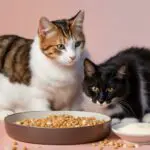Greetings! Today, I am here to shed light on a curious question: Can kittens drink milk from a dog? This topic has sparked much debate and confusion among pet owners, and it’s essential to separate fact from fiction. Let’s dive into the world of feline nutrition and explore the truth behind this intriguing inquiry.
Key Takeaways:
- In emergency situations, kittens can consume milk from a dog, but it should be a temporary solution.
- Under normal circumstances, kittens should be exclusively fed by their own cat mother.
- Dogs can potentially nurse and produce milk for a kitten, but proper care must be taken to ensure the well-being of both animals.
- Cats and dogs have different dietary requirements, and it’s crucial to provide each species with a balanced, species-specific diet.
- Consulting with a veterinarian is recommended for specific guidance on caring for kittens and cats.
Can A Dog Nurse A Kitten?
Under certain circumstances, a dog nursing a kitten can be a safe and nurturing experience for both animals. Female dogs have maternal instincts that may drive them to care for a kitten as if it were their own. Hormones like oxytocin and prolactin play a role in a dog’s ability to nurse and produce milk.
It is crucial to ensure that the dog is not mistreated during the nursing process to avoid any harm to both the dog and the kitten. Proper supervision and care are essential to prevent any accidents or aggressive behavior. Introducing the dog and the kitten slowly and gradually can help them build trust and develop a bond.
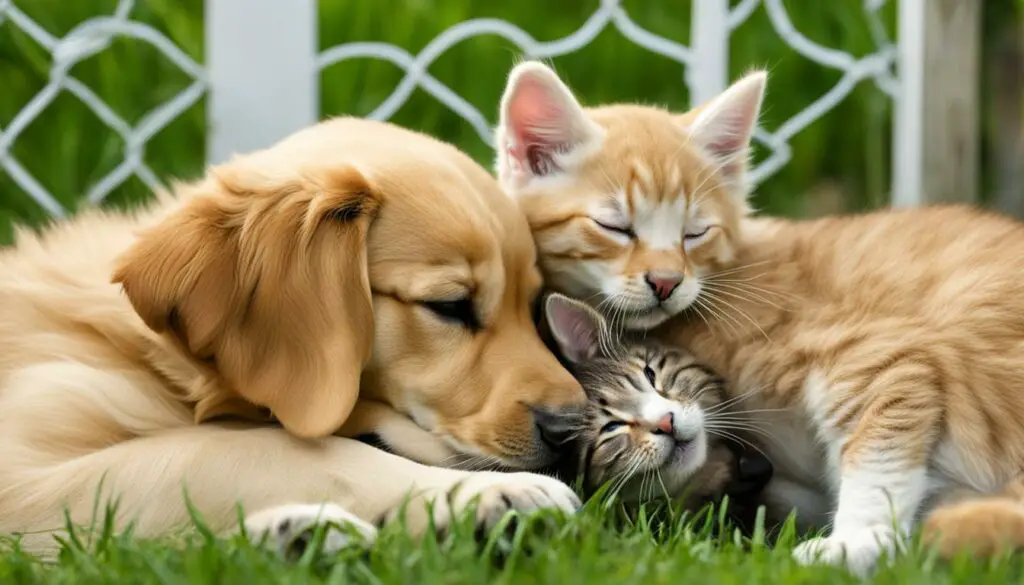
| Benefits of Dog Nursing a Kitten | |
|---|---|
| 1. | Provides nourishment and warmth to the kitten |
| 2. | Offers a nurturing environment for the kitten’s growth and development |
| 3. | Promotes socialization and helps the kitten learn from the dog’s behavior |
“Under certain circumstances, a dog nursing a kitten can be a safe and nurturing experience for both animals.”
It is important to note that not all dogs may be suitable for nursing a kitten. Some dogs may exhibit aggressive or territorial behavior, which can pose a threat to the safety of the kitten. It is crucial to assess the dog’s temperament and behavior before allowing them to nurse a kitten.
Overall, a dog nursing a kitten can be a positive experience if done under the right circumstances and with careful supervision. It is always recommended to consult with a veterinarian or animal behaviorist for guidance and to ensure the well-being of both animals involved.
Can A Dog Produce Milk For A Kitten?
Yes, a dog can produce milk for a kitten in certain situations. This can be especially beneficial when a kitten is orphaned or separated from its own mother. A dog can act as a surrogate mother, providing the much-needed nourishment and care that a kitten requires. However, it’s important to note that a dog’s milk alone may not provide all the necessary nutrients for a kitten’s growth and development.
In order to ensure the kitten receives a balanced diet, it is recommended to supplement the dog’s milk with a cat-specific formula, which can be obtained from a veterinarian. This will help ensure that the kitten receives all the essential nutrients it needs for healthy development. It’s also important to monitor the health of both the dog and the kitten during this process to ensure they are both thriving.
Benefits of a Dog Nursing a Kitten:
- Provides nourishment and care for orphaned or separated kittens.
- Can act as a surrogate mother, fulfilling the kitten’s need for maternal care.
- Can be a temporary solution until an appropriate foster or adoptive mother can be found.
Risks and Considerations:
- Ensure the dog is not mistreated or stressed during the nursing process.
- Supplement the dog’s milk with a cat-specific formula to ensure proper nutrition.
- Monitor the health of both the dog and the kitten to ensure they are thriving.
Overall, a dog can produce milk for a kitten in certain circumstances, but it’s important to provide supplemental nutrition and monitor the health of both animals during this process. Consulting with a veterinarian is recommended to ensure the well-being of the animals and to obtain appropriate guidance for their care.
| Benefits of a Dog Nursing a Kitten | Risks and Considerations |
|---|---|
| Provides nourishment and care for orphaned or separated kittens. | Ensure the dog is not mistreated or stressed during the nursing process. |
| Can act as a surrogate mother, fulfilling the kitten’s need for maternal care. | Supplement the dog’s milk with a cat-specific formula to ensure proper nutrition. |
| Can be a temporary solution until an appropriate foster or adoptive mother can be found. | Monitor the health of both the dog and the kitten to ensure they are thriving. |
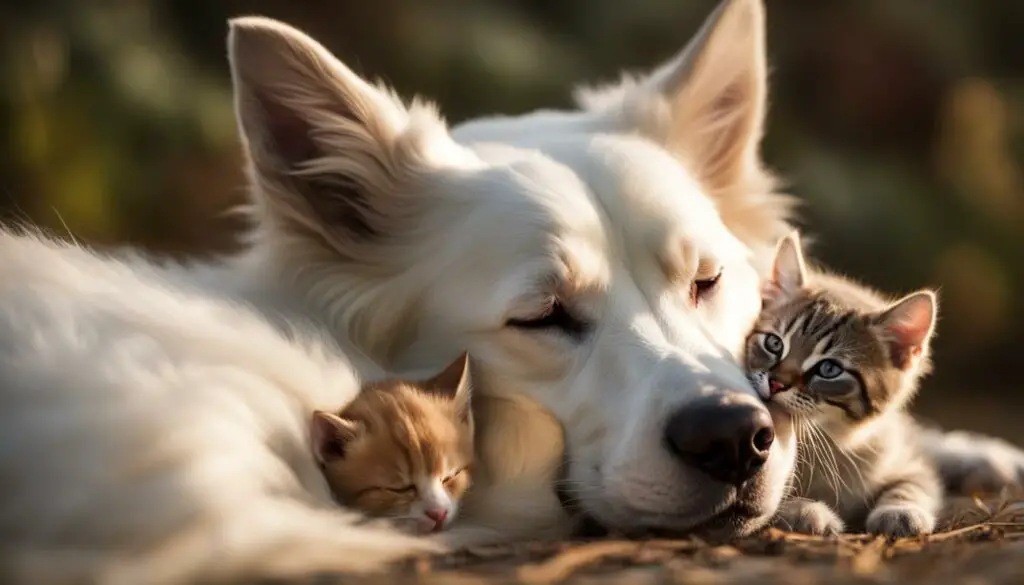
Can Kittens Drink Milk From A Dog?
In emergency situations, kittens can consume dog milk if their own mother is unavailable. However, it should be noted that kittens are ideally meant to feed on their own cat mother within the first 24 hours after birth. The mother cat produces colostrum during this period, which contains important antibodies for the kittens’ immune system. While dog milk can be a temporary substitute, it is best for kittens to be fed by their own mother whenever possible.
To understand the advantages and risks of kittens drinking milk from a dog, it is important to consider their specific nutritional needs. Cat milk is specifically formulated to provide the necessary nutrients and antibodies for kittens’ growth and development. It contains higher levels of fat and protein compared to dog milk. Additionally, cat milk has a different composition and balance of vitamins and minerals that are essential for kittens.
While dog milk can provide some nutrition to kittens in emergency situations, it may not fully meet their specific dietary requirements. It is important to consult with a veterinarian for guidance on appropriate milk substitutes and supplements for orphaned or abandoned kittens. A veterinarian can also provide advice on proper feeding techniques and schedules to ensure the health and well-being of the kittens.
Table: Comparison of Cat Milk and Dog Milk
| Nutrient | Cat Milk | Dog Milk |
|---|---|---|
| Protein | Higher levels | Lower levels |
| Fat | Higher levels | Lower levels |
| Carbohydrates | Lower levels | Higher levels |
| Vitamins and Minerals | Specific balance for kittens | Different composition |
While dog milk can be a temporary solution in emergency situations, it is important to prioritize the well-being and development of kittens by ensuring they receive appropriate nutrition. Whenever possible, kittens should be fed by their own cat mother, as cat milk provides the ideal balance of nutrients and antibodies for their growth and immune system.
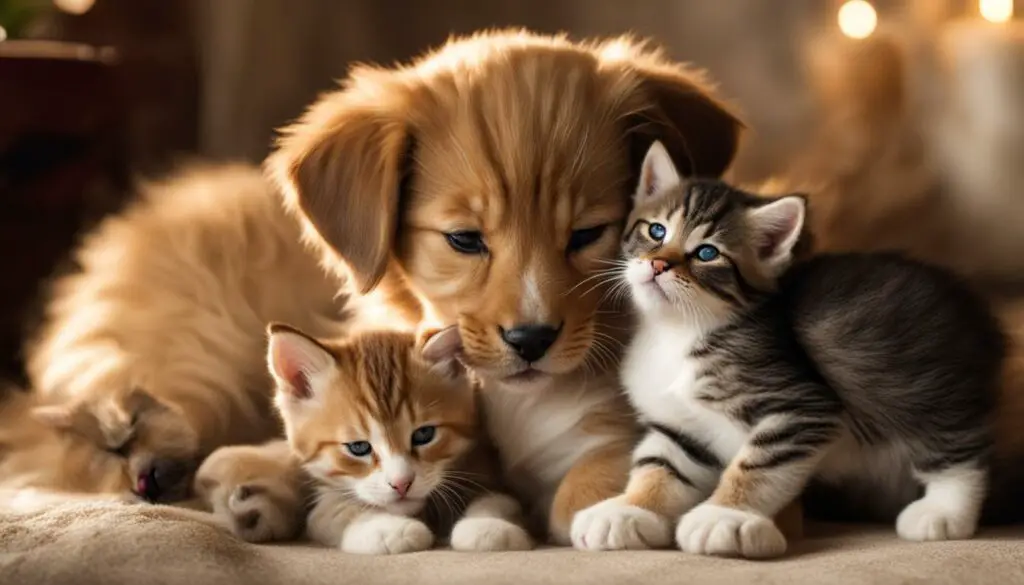
Is Dog Milk Good For Cats?
Many pet owners may wonder if dog milk is a suitable alternative for their cats. While dogs and cats have different dietary requirements, it is possible for cats to consume dog milk in small amounts. However, it is important to note that dog milk should not be relied upon as the primary source of nutrition for cats.
Cats have specific nutritional needs that are best met through a balanced diet formulated for their species. A cat-specific diet ensures that they receive the essential nutrients, vitamins, and minerals necessary for their overall health and well-being. While dog milk may not be harmful in small quantities, it does not provide the appropriate nutritional profile that cats require.
It is always recommended to consult with a veterinarian regarding the best diet for your cat based on their individual needs and health conditions.
| Can Cats Drink Dog Milk? | Yes, in small quantities. However, it is not an ideal or necessary source of nutrition for cats. |
|---|---|
| Benefits of Dog Milk for Cats | – Provides hydration – Can be a temporary substitute in emergency situations – May offer some nutritional value |
| Risks of Dog Milk for Cats | – Does not meet the specific nutritional needs of cats – May cause digestive upset or intolerance – Can contribute to imbalances in the cat’s diet |
In conclusion, while it is possible for cats to consume small amounts of dog milk, it is not recommended as an everyday source of nutrition. Cats require a diet tailored to their specific needs, and dog milk does not provide the necessary nutrients for their overall health. Consult with a veterinarian to ensure your cat receives the appropriate diet and nutritional support.
Can Kittens Drink Dog Milk Replacer?
When it comes to feeding newborn kittens, it is essential to provide them with the proper nutrition for their growth and development. While it may be tempting to use dog milk replacer as an alternative, it is not recommended. Dog milk replacer is specifically formulated for the nutritional needs of puppies, and it may not provide the necessary nutrients that kittens require.
Kittens have unique dietary requirements, and their nutritional needs are best met through a specially formulated milk replacer made specifically for kittens and puppies. Cow’s milk or human newborn formula should never be given to young kittens as they lack the necessary nutrients for their growth and development. It is important to provide newborn kittens with the appropriate kitten milk replacer to ensure they receive the necessary nutrients for their health and well-being.
Consultation with a veterinarian is crucial when it comes to caring for newborn kittens. They can provide advice on the best milk replacers available and guide you on proper feeding techniques. It is important to follow their recommendations to ensure the kittens’ nutritional needs are met and to promote their healthy growth.
| Kitten Milk Replacer | Dog Milk Replacer |
|---|---|
| Specially formulated for kittens | Specially formulated for puppies |
| Contains necessary nutrients for kitten growth and development | May not provide essential nutrients for kittens |
| Recommended by veterinarians for proper kitten nutrition | Not recommended for kittens |
It is important to prioritize the health and well-being of newborn kittens by providing them with the appropriate nutrition. By using a kitten milk replacer, you can ensure that they receive the necessary nutrients for their growth and development, setting them up for a healthy and happy life.
Myth #1: Milk makes an ideal food for cats
The traditional image of a cat lapping milk from a bowl is misleading. While cats may enjoy the taste of milk, especially cream, the milk we buy in supermarkets contains little fat and can be difficult for cats to digest. Cats are obligate carnivores and their nutritional needs are best met through a balanced, meat-based diet rather than milk.
“Cats, unlike dogs, lack the enzyme lactase, which is necessary to break down lactose, the sugar found in milk,” says Dr. Emily Brown, a veterinarian specializing in feline nutrition. “Feeding cats milk can lead to digestive upset, including diarrhea, gas, and bloating.”
It’s important to note that kittens are an exception to this rule. They require the milk from their mother during their first few weeks of life, as it provides essential nutrients and antibodies to support their growth and immune system development. However, once kittens are weaned, they no longer require milk and should transition to a solid food diet.

To ensure that your cat receives the proper nutrition, it’s best to stick to a high-quality commercial cat food that is specifically formulated to meet their dietary needs. These foods are carefully balanced to provide the right amounts of protein, fat, carbohydrates, and essential vitamins and minerals.
Remember, when it comes to cats and milk, it’s better to err on the side of caution and prioritize their overall health and well-being.
Myth #2: Cats can’t be trained
Contrary to popular belief, cats are capable of being trained. While they may not be as motivated by human attention as dogs, they can still learn and respond to training methods that use positive reinforcement. I have personally trained several cats throughout my career as a professional animal trainer, and I can attest to their intelligence and ability to learn.
Training a cat requires patience and perseverance. It is important to understand that cats have their own unique personalities and motivations. Each cat will respond differently to different training techniques, so it may take some trial and error to find the methods that work best for your feline companion.
One effective training approach is to use treats and rewards to reinforce desired behaviors. Cats are naturally food-motivated, so using their favorite treats as rewards can be a powerful incentive. For example, if you want to train your cat to come when called, you can use a clicker and reward them with treats each time they respond to their name. Over time, they will associate the sound of the clicker with the treat and will come when called without the need for a reward.
Training Tips for Cats:
- Use positive reinforcement: Reward your cat with treats, praise, or playtime when they exhibit the desired behavior.
- Be consistent: Establish a consistent training routine and use the same commands and cues each time.
- Keep sessions short: Cats have short attention spans, so keep training sessions brief and engaging.
- Use clicker training: Clicker training can be a useful tool for cats, as it provides a clear sound marker for desired behaviors.
“Training can improve a cat’s well-being and make certain tasks, such as vet visits, less stressful for both the cat and the owner.”
Remember, training should always be a positive experience for both you and your cat. Avoid punishment-based training methods, as they can lead to fear and stress in your feline friend. Instead, focus on creating a bond of trust and respect through positive reinforcement. With patience and consistency, you can successfully train your cat and enhance their overall well-being.
Myth #3: Curiosity killed the cat
Curiosity is often associated with cats, and the saying “curiosity killed the cat” implies that being curious can lead to dangerous or deadly situations for feline friends. However, this myth is far from the truth. While cats are naturally curious creatures, they are also cautious and have a strong sense of self-preservation.
Unlike dogs, cats are more likely to approach unfamiliar situations or objects cautiously, assessing the potential risks before engaging. This innate cautiousness helps them avoid dangerous situations, keeping themselves safe. Cats are known for their agility and reflexes, which further protect them from harm.
While it’s important to provide a safe and enriching environment for cats to explore and satisfy their curiosity, their natural instincts will typically prevent them from getting into situations that could truly harm them. It’s essential for cat owners to create a safe space for their feline friends to roam and explore, ensuring that potential hazards are kept out of reach.
Curious Cats: The Benefits of a Stimulating Environment
A stimulating environment that allows cats to indulge their curiosity offers several benefits. It helps prevent boredom and encourages mental stimulation, which is crucial for their overall well-being. Here are some tips to create an enriching environment for your curious cat:
- Provide interactive toys that offer mental and physical stimulation.
- Create vertical spaces such as cat trees or shelves to satisfy their natural climbing instincts.
- Offer hiding spots like cozy beds or covered boxes where they can retreat when they feel the need for privacy.
- Rotate toys and introduce new ones regularly to keep their interest piqued.
- Engage in playtime and interactive activities with your cat to strengthen the bond between you and provide a healthy outlet for their curiosity.
In conclusion, while curiosity is an inherent trait in cats, the myth that curiosity kills them is unfounded. Cats are naturally cautious and rely on their instincts to navigate through new environments. By providing a safe and stimulating environment, cat owners can encourage their feline friends to indulge their curiosity while ensuring their well-being and happiness.

Myth #4: Cats are domesticated animals
Contrary to popular belief, cats are not fully domesticated animals. While some pedigree cats can be considered domesticated, the majority of pet cats are descendants of feral cats and retain certain wild traits. Domestication refers to the genetic and behavioral changes that occur over generations of selective breeding and living in close proximity to humans. Fully domesticated animals, such as dogs, have undergone significant genetic and behavioral changes to adapt to life with humans. Cats, on the other hand, have a more complex relationship with humans.
Many pet cats display a range of behaviors that are more characteristic of their wild counterparts. These behaviors include hunting instincts, marking territory, and a preference for independence. Cats have also retained their natural hunting skills, often bringing prey back to their owners as a display of their hunting prowess. This highlights the fact that cats have not fully relinquished their wild instincts and tendencies.
It is important for cat owners to understand and respect the natural instincts of their feline companions. Providing a stimulating environment with opportunities for hunting, climbing, and other natural behaviors can help keep cats mentally and physically healthy. Recognizing that cats are not fully domesticated animals allows owners to better meet their unique needs and ensure their overall well-being.
| Myth | Reality |
|---|---|
| Cats are fully domesticated animals. | Cats retain certain wild traits and behaviors. |
| Cats have no connection to their wild ancestors. | Cats are descendants of feral cats and still exhibit wild instincts. |
| Cats can be easily tamed and trained like dogs. | Cats have their own unique behaviors and preferences. |
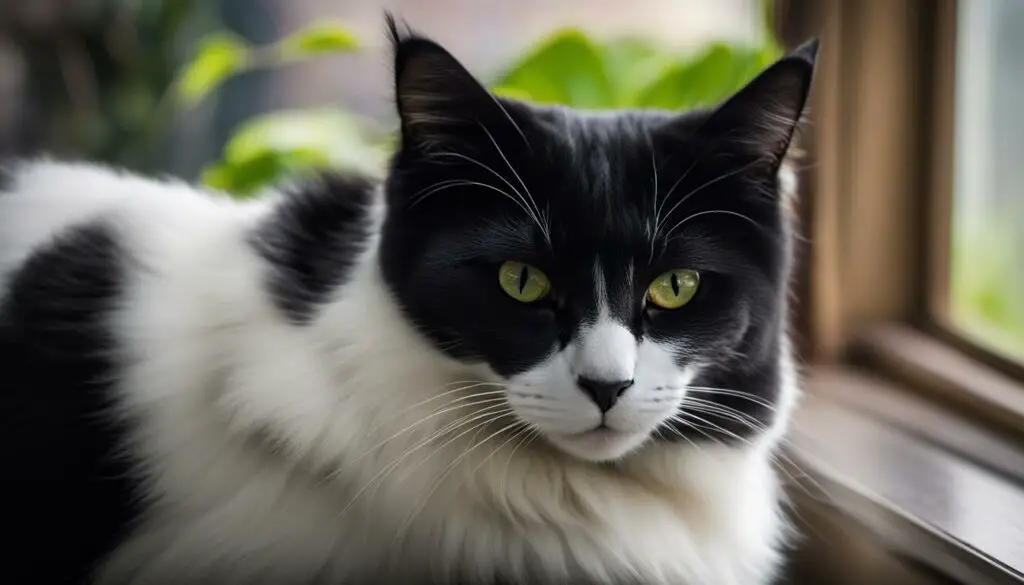
The Evolution of Cats
The domestication of cats is a complex process that dates back thousands of years. Originally, cats were attracted to human settlements due to the presence of rodents, which provided a source of food. Over time, humans began to selectively breed cats for certain traits, leading to the development of different breeds with varying characteristics.
I think it’s important to remember that cats are still very much their own beings. They have their own desires, instincts, and ways of interacting with the world. It’s our responsibility as cat owners to understand and respect their unique nature.
While cats may not be fully domesticated like dogs, they have still formed a unique bond with humans. Many cats enjoy the comfort and security of living in human homes and develop strong attachments to their owners. However, it is important to remember that cats are individuals with their own personalities and preferences. Understanding and appreciating their natural instincts can help foster a harmonious and fulfilling relationship between cats and their human companions.
Myth #5: Cats Know What Their Owners Are Thinking
It’s a common belief that cats possess an almost supernatural ability to read their owners’ minds, but this is simply a myth. While cats can form strong bonds with their human companions and may exhibit behaviors that seem to indicate an understanding of human emotions, they do not possess the cognitive abilities necessary for mind-reading.

“Cats rely more on body language and their own instincts to communicate and navigate their surroundings.”
Cats have their own unique ways of communicating and understanding the world around them. They rely heavily on their acute senses, such as their keen hearing and sense of smell, to gather information about their environment. Cats are highly attuned to body language and subtle cues, which they use to interpret and respond to their surroundings.
While it may seem like your cat understands when you’re sad or happy, it is more likely that they are responding to your body language and the tone of your voice rather than truly comprehending your thoughts and emotions. Cats are intuitive creatures and may pick up on subtle changes in your behavior, but they are not mind-readers.
So, while it’s tempting to believe that our feline friends can peer into our souls and know our deepest thoughts, the reality is that cats rely on their own instincts and sensory perceptions to navigate the world around them. Understanding and respecting their unique communication styles can help strengthen the bond between cats and their owners.
Cats vs Dogs: Debunking the Myth About Dogs’ Sense of Smell
When it comes to the sense of smell, dogs are often hailed as the champions, but that doesn’t mean that cats are lacking in this department. While it is true that dogs have a more acute sense of smell compared to cats, felines still possess a highly developed olfactory system. Cats have a unique organ called the Jacobson’s organ, which allows them to detect pheromones and other scents that humans or dogs may miss.
Contrary to popular belief, cats rely heavily on their sense of smell for communication and navigating their environment. They use their keen sense of smell to mark territory, identify potential prey, and even detect changes in their environment. This heightened olfactory capability is one of the reasons why cats are often seen sniffing around objects and areas, as they gather valuable information through their sense of smell.
“While dogs may have a better sense of smell overall, cats have their own unique olfactory capabilities that should not be underestimated.”
It is important to recognize that cats and dogs have different sensory strengths. Dogs are known for their tracking abilities and are often used in search and rescue operations, while cats excel in detecting subtle changes in their surroundings. Dogs may have the upper paw when it comes to tracking scents over long distances, but cats’ olfactory prowess should not be overlooked.
| Cats | Dogs | |
|---|---|---|
| Sense of Smell | Highly developed with the Jacobson’s organ | More acute, specialized for tracking scents over long distances |
| Communication | Relies heavily on scent marking and detecting pheromones | Uses scent for communication and tracking |
| Environment | Detects subtle changes in the surroundings | Can track scents across vast areas |
So, while dogs may hold the title for the best sense of smell overall, it is essential to appreciate and respect the olfactory capabilities of our feline friends. Cats may not be able to rival dogs in terms of tracking scents over long distances, but they have their own unique abilities that make them remarkable animals.
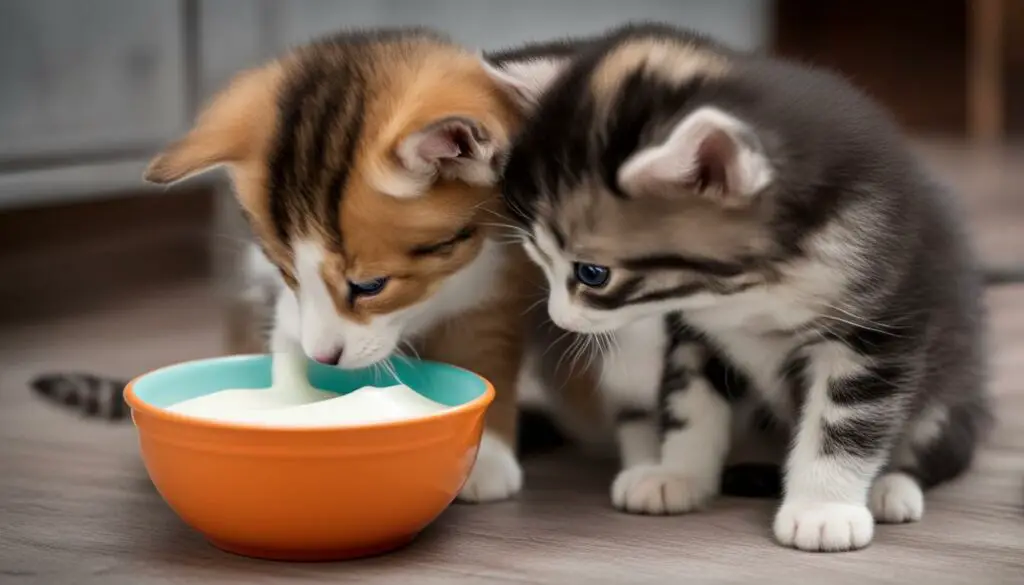
What milk can dogs and cats drink?
While milk may not be the best treat for cats and dogs, there are specially designed milks available for them. These pet or lactose-free milks can be a safer option for those wanting to give their pets a milk-based treat. It is important to consult with a veterinarian to determine the most appropriate treats and nutritional options for your pets.
Table: Comparison of Milk Options for Cats and Dogs
| Milk Option | Ingredients | Benefits | Considerations |
|---|---|---|---|
| Lactose-Free Milk | Lactose-Free cow’s milk or plant-based milk | – Suitable for pets with lactose intolerance – Provides a milk-like treat |
– Some cats and dogs may be sensitive to certain plant-based milks – Should be given in moderation |
| Kitten Milk Replacer | Formulated milk for kittens | – Mimics the nutritional composition of cat mother’s milk – Nutrient-rich for growing kittens |
– Not suitable for adult cats or dogs – Should only be given to kittens as directed by a veterinarian |
| Puppy Milk Replacer | Formulated milk for puppies | – Mimics the nutritional composition of dog mother’s milk – Nutrient-rich for growing puppies |
– Not suitable for adult cats or dogs – Should only be given to puppies as directed by a veterinarian |
It is important to note that while these milk options can be safe alternatives, they should not replace a balanced and species-specific diet. Milk should only be given as an occasional treat and in moderation. Always consult with a veterinarian for specific recommendations based on your pet’s individual needs.
Remember, the type of milk suitable for your pets may vary depending on their age, health condition, and dietary requirements. It is always best to seek professional advice from a veterinarian to ensure you are making the most appropriate choices for your furry friends.
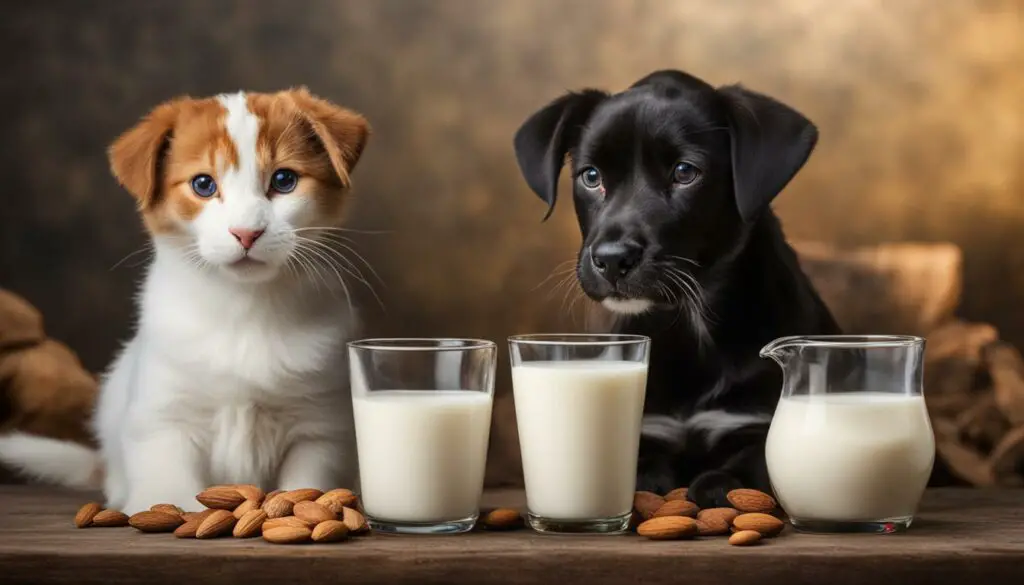
Conclusion
After examining the facts, it is clear that while kittens can drink milk from a dog in emergency situations, it is not the ideal or recommended option. Kittens should ideally be fed by their own cat mother during the first 24 hours after birth, as their mother’s milk contains essential antibodies for their immune system. While a dog can potentially nurse and produce milk for a kitten, it is crucial to ensure the well-being of both animals during this process.
It is also important to note that dog milk is not a suitable long-term replacement for a kitten’s nutritional needs. Kittens require a balanced, species-specific diet to ensure proper growth and development. Dog milk should be supplemented with a cat-specific formula to provide all the necessary nutrients.
If you are considering giving milk to your pets, it is best to consult with a veterinarian. While there are specially designed milks available for cats and dogs, milk is generally not a necessary or ideal treat for them. It is important to prioritize their overall health and provide them with appropriate and balanced dietary options.
In conclusion, while kittens can temporarily consume milk from a dog, it is best to prioritize their own cat mother’s milk and ensure they receive a nutritionally balanced diet. Consultation with a veterinarian is always recommended for specific guidance on caring for kittens and cats.
FAQ
Can kittens drink milk from a dog?
Under emergency situations, kittens can consume milk from a dog. However, they should ideally be fed by their own cat mother for proper nutrition.
Can a dog nurse a kitten?
Yes, a dog can nurse a kitten and produce milk for it. This can be beneficial in certain situations where a kitten is orphaned or separated from its own mother.
Can a dog produce milk for a kitten?
Female dogs have maternal instincts and can produce milk for a kitten. However, it is important to supplement the dog’s milk with a cat-specific formula for proper nutrition.
Can kittens drink milk from a dog?
In emergency situations, kittens can consume milk from a dog if their own mother is unavailable. However, it is best for kittens to be fed by their own cat mother whenever possible.
Is dog milk good for cats?
Dog milk is not an ideal or necessary source of nutrition for cats. Cats have different dietary requirements and their nutritional needs are best met through a balanced cat-specific diet.
Can kittens drink dog milk replacer?
No, newborn kittens should not be given dog milk replacer. They require a specially formulated milk replacer made specifically for kittens and puppies.
Myth #1: Milk makes an ideal food for cats
While cats may enjoy the taste of milk, it can be difficult for them to digest. Cats are obligate carnivores and their nutritional needs are best met through a balanced, meat-based diet rather than milk.
Myth #2: Cats can’t be trained
Contrary to popular belief, cats can be trained. They may not be as motivated by human attention as dogs, but they can still learn and respond to training methods that use positive reinforcement.
Myth #3: Curiosity killed the cat
The saying “curiosity killed the cat” is not an accurate representation of cats’ behavior. While some cats may be more curious than others, they are generally cautious and will approach unfamiliar situations from a safe distance.
Myth #4: Cats are domesticated animals
While some pedigree cats can be considered fully domesticated, the majority of cats are not. Many pet cats are descendants of feral cats and still retain certain wild traits.
Myth #5: Cats know what their owners are thinking
Cats do not possess the ability to read minds or understand human thoughts. They rely more on body language and their own instincts to communicate and navigate their surroundings.
Myth #6: A dog’s sense of smell is more sensitive than a cat’s
Dogs do have a better sense of smell compared to cats, but cats still have a highly developed sense of smell. Both cats and dogs have their own unique olfactory capabilities.
What milk can dogs and cats drink?
While milk may not be the best treat for cats and dogs, there are specially designed milks available for them. These pet or lactose-free milks can be a safer option for those wanting to give their pets a milk-based treat.
Conclusion
In conclusion, kittens can consume milk from a dog in emergency situations. However, it is best for kittens to be fed by their own cat mother whenever possible. Consultation with a veterinarian is always recommended for specific guidance on caring for kittens and cats.



